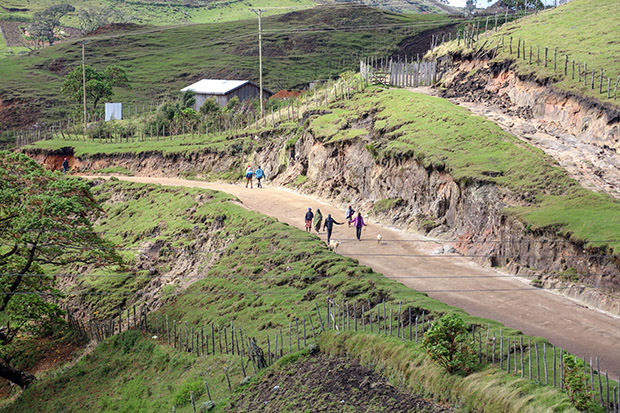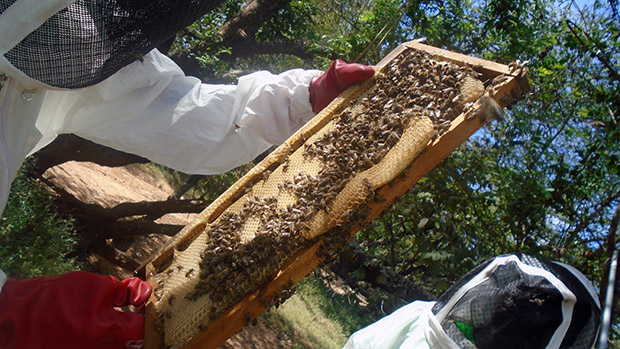In 2016 and 2017, many parts of Kenya suffered through long, ravaging droughts. In 2018 and 2019, climate change flipped this vicious cycle, and heavy rains wreaked havoc on many of the same areas.
Among the affected areas was West Pokot County, in Kenya’s North Rift region. During the extended droughts, crops failed and livestock died. An increasing number of people left in search of work and survival elsewhere. Conflicts between communities flared as competition for scarce resources strained relations. Larger issues such as malnutrition, starvation and disease outbreaks began to grow. Desperate parents increasingly turn to early marriage for their daughters, depriving girls of the chance to finish school and increasing risks of domestic violence.
And then the floods came, destroying homes and livelihoods and cutting people off from basic services. And now, the coronavirus pandemic poses a new threat to these same families.
To say that this is an overwhelming situation would be an understatement. But CWS and our local partners are committed to helping families here cope and hopefully build resilience for the future.

CWS distributed emergency food packages and blankets to 750 families in West Pokot County in December.
Our work, which unfolds in partnership with local organization YANG’AT, focuses on both immediate and long-term recovery. In December, our team distributed emergency food rations and blankets to 750 families following deadly flooding and landslides. But it’s the long-term resilience that we want to focus on now. After extensive conversation with and data collection in communities in West Pokot County, and following the devastating drought in the area in 2016/2017, our team settled on two main program focuses. The first is beekeeping, and the second is village savings and loans groups.
Beekeeping is a great way for families to earn incomes while living in harsh climates. It is an activity with a limited environmental footprint, and families can earn a significant income by harvesting and selling honey. Our team and partners are helping families use modern beekeeping technologies, which include better hive designs and have the potential to help families earn six times as much as traditional beekeeping. When disaster strikes, the income that they have earned from activities like beekeeping can help them pay for supplies and repairs to speed recovery. Plus, on a practical note, beehives hang in trees, high above floodwaters. They are more likely than other livelihood activities to survive a flood unscathed.
Village Savings and Loans Groups also help families build financial stability. Community members get together in groups and pool their money, a little at a time. Members can take out low-interest loans to start or expand businesses. These funds also act as financial cushions during times of disaster.
This program was conceived in the midst of cyclical droughts and floods. And already the activities have begun to bear fruits and slowly create resilience. More than 400 people have created and joined 14 savings groups. Six groups of beekeepers, with 180 total people, have launched modern beekeeping businesses. More people are being trained in beekeeping and financial literacy. They are staying put and reducing their environmental impact. Most importantly, they are relying on each other and building stronger community ties. And as people around the world are facing disruptions in daily life and unemployment from the coronavirus pandemic, these families have fared relatively well. They still have access to income and resources during the pandemic.
Angolekori Kale from the community of Amura is one of these beekeepers and savings group members. During this time of economic fear and uncertainty, Angolekori is financially stable. “I have five modern beehives, with two that have been colonized,” he says. “I harvested honey from one of them, which I sold to African Beekeepers Limited, a buyer introduced to us by CWS. I received $33.50. I used $2 to help pay laborers to weed my 2.5-acre maize farm. I bought food with $3 and saved $28.50. I am planning to invest by buying goats once the prices lower. My family includes four children and a wife, and we all felt so good when we received the money.”
“The beekeeping project is a project worth venturing into,” Angolekori advises. “I will work on the hives that have not been colonized, because if I could have sold honey from all five beehives, I could have earned over $150 to help me buy a cow. I want to work on them to ensure that they clean all the time, and I will move them to strategic places where bees can more easily colonize them.”
Dozens of families are reporting similar successes. And word has gotten out. People from neighboring communities are showing up to training sessions to learn from the success of the program participants. Some of the most marginalized people in West Pokot County, including women, are now more included in their communities’ economies. Several women and women-headed households have seen significant earnings. When combined with other CWS programs that focus on water and school access, these activities have led to higher enrollment of girls in school and a reduction in gender-based violence in the area.
Our work in West Pokot County has been celebrated by the County’s leadership, including its Governor. And we’re so grateful to see and hear these success stories in the midst of a horrifying pandemic. We’re seeing stability and resilience, and we know that these families will be stronger in the face of the next storm that comes.
Mary Obiero is the Director of CWS’s Relief, Development and Protection team in Africa. Michael Kendagor is the team’s Coordinator of Emergency Response and Disaster Risk Reduction.



